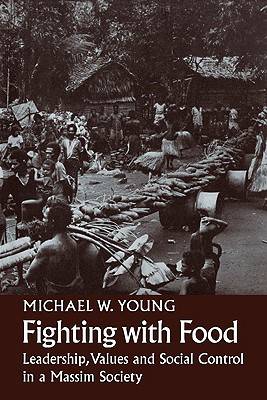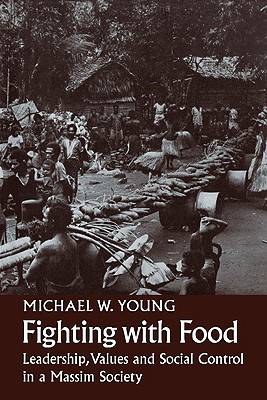
- Afhalen na 1 uur in een winkel met voorraad
- Gratis thuislevering in België vanaf € 30
- Ruim aanbod met 7 miljoen producten
- Afhalen na 1 uur in een winkel met voorraad
- Gratis thuislevering in België vanaf € 30
- Ruim aanbod met 7 miljoen producten
Zoeken
Fighting with Food
Leadership, Values and Social Control in a Massim Society
Michael W Young
Paperback | Engels
€ 70,95
+ 141 punten
Omschrijving
The Melanesians of Goodenough Island, off the eastern coast of New Guinea, have developed the principle of gift-giving to an extraordinary degree. Instead of resorting to arms in their quarrels or demanding compensation for offences, they present enemies and offenders with pigs and yams in order to shame them. This custom of coercive gift-giving operates at various organizational levels and through two main institutional forms: competitive food exchange and festivals. Dr Young analyses in depth the social and political structure of a single village, dealing in detail with its system of social control and those vexed topics of Melanesian ethnography - leadership and sorcery. Of particular interest is the author's description of the configuration of values which makes food-giving-to-shame meaningful to the Goodenough Islander for whom 'happiness is a rotting yam', and the worst evil 'hunger-producing sorcery'. The careful use of case material gives vivid insights into the lifestyle, world view and humanity of these proud and fractious people.
Specificaties
Betrokkenen
- Auteur(s):
- Uitgeverij:
Inhoud
- Aantal bladzijden:
- 312
- Taal:
- Engels
Eigenschappen
- Productcode (EAN):
- 9780521107662
- Verschijningsdatum:
- 19/02/2009
- Uitvoering:
- Paperback
- Formaat:
- Trade paperback (VS)
- Afmetingen:
- 152 mm x 229 mm
- Gewicht:
- 458 g

Alleen bij Standaard Boekhandel
+ 141 punten op je klantenkaart van Standaard Boekhandel
Beoordelingen
We publiceren alleen reviews die voldoen aan de voorwaarden voor reviews. Bekijk onze voorwaarden voor reviews.








